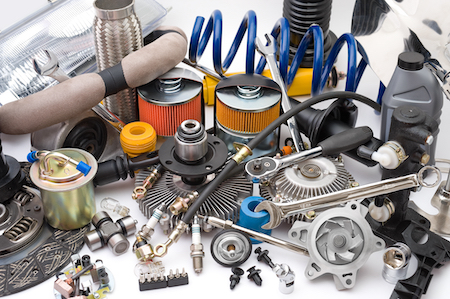According to the Global Language Monitor, the English language currently contains over 1 million words. Of course, we don’t use nearly that many in our everyday language.
The Oxford English Dictionary contains 171,476 words in current use, while Webster’s Third New International Dictionary includes 470,000 entries of both current use and obsolete words.
Even with this many words available to us, the average individual has a vocabulary size of about 48,000 words. Yet most of us never use more than the first 1,000 or so on a regular basis.
So when words like transmission, radiator, or gearbox pop up, it’s only natural to scratch your head and think about what they mean. We know car parts are essential. We understand car parts work together to create one of our most meaningful personal assets. But what are they, and how do they work?
We’ve compiled a list of 15 essential car parts, how they work, and what could go wrong. It’s a great place to start to get to know your car a little better.
Air Filter: Breathing Easy
Picture this: you’re running a marathon, and suddenly, your nose gets clogged, making it hard to breathe. That’s essentially how a car’s air filter works. It ensures that clean air reaches the engine by trapping dust, dirt, and debris, preventing them from entering and potentially causing damage.
Replace your air filter regularly for better engine performance and fuel efficiency.
Alternator: Power Provider
The alternator is like a mini power station in your car. It charges the battery while the engine is running and supplies electrical power to various components, such as lights, radio, and power windows. Without a functioning alternator, you’d find yourself stuck in the dark with a dead battery.
If you suspect you have a problem with the alternator, have it checked by one of our mechanics.
Battery: Life-Giver
Your car’s battery is the heartbeat of the electrical system. It stores energy to start the engine and powers all the electrical components when the alternator can’t supply enough electricity.
Regularly check your battery’s health and make sure the connections are clean and secure to avoid unexpected breakdowns.
Brake Rotors: Slowing Down Safely
Imagine driving without brakes – terrifying, right? Brake rotors, also known as brake discs, are crucial for stopping your car safely. When you apply the brakes, the brake pads clamp onto the rotors, creating friction that slows down your car.
Like other car parts, brake rotors have a useful life. Check your owner’s manual for guidelines, then keep an eye on these vital components and replace them when they become too thin or damaged.
Catalytic Converter: Environment’s Ally
In the age of environmental consciousness, the catalytic converter plays a vital role in reducing harmful emissions. It converts harmful gasses, like carbon monoxide and nitrogen oxides, into less toxic substances before they exit through the exhaust pipe.
Always ensure your catalytic converter is functioning correctly to minimize your car’s environmental impact.
Clutch: Seamless Gear Changes
Manual transmission lovers, this one’s for you! The clutch allows you to shift gears smoothly by temporarily disconnecting the engine from the transmission. It’s essential to avoid riding the clutch or engaging in abrupt gear changes to prevent premature wear and tear.
This is where paying attention to how your car operates matters. If you notice changes in the way the clutch operates, bring it in for a thorough inspection.
Emissions Control System: Caring for the Environment
In an era where environmental concerns are at the forefront of our minds, the emissions control system in your car plays a critical role in reducing harmful pollutants released into the atmosphere. As cars run on internal combustion engines, they produce various harmful gasses as byproducts of the combustion process: Nitrogen Oxides (NOx), Hydrocarbons (HC), and Carbon Monoxide (CO). The emissions control system employs various components to minimize the release of these harmful gasses into the atmosphere.
To keep the emissions control system functioning optimally, it’s crucial to follow the manufacturer’s recommended maintenance schedule. Regular servicing and replacing worn-out components are essential to ensure that your car remains compliant with emission standards and contributes to a cleaner environment.
Gearbox: Power Transfer Pro
The gearbox, or transmission, is the bridge between your car’s engine and wheels. It allows you to change gears, enabling the engine to operate efficiently at various speeds.
Regular transmission maintenance can extend its lifespan and keep your shifts buttery smooth.
Ignition: Start It Up!
The ignition system gets your car’s engine roaring to life. It creates and delivers the high-voltage sparks needed to ignite the air-fuel mixture in the engine’s cylinders. Modern vehicles mostly have electronic ignition systems, which are more reliable and efficient than the older mechanical ones. Yet things can still go wrong.
Having trouble starting your car? Don’t automatically assume it’s the battery. The ignition can and does wear down over time.
Radiator: Keeping Cool Under Pressure
Driving generates a lot of heat under the hood, but fear not – the radiator is here to keep things cool. It circulates coolant through the engine, absorbing excess heat, and then releases that heat into the air.
A well-maintained radiator is vital to prevent overheating, which can cause severe engine damage. That starts with checking the coolant occasionally and ensuring there aren’t any leaks or problems with the system.
Shock Absorbers: Smooth Ride Ahead
Ever wonder why you don’t feel every bump and pothole on the road? Thank your car’s shock absorbers for that! They dampen the impact of uneven surfaces, providing you with a smoother and more comfortable ride.
Replace worn-out shocks to maintain optimal handling and comfort.
Spark Plug: Igniting the Magic
Spark plugs might be small, but they play a big role in your car’s performance. They generate sparks that ignite the air-fuel mixture in the engine’s cylinders, creating the controlled explosions that move your car.
Proper maintenance and periodic replacements will keep your engine running like a champ.
Thermostat: Temperature Regulator
The thermostat is the ultimate temperature regulator. It monitors the engine’s temperature and opens or closes to control the flow of coolant. This ensures that your engine stays within its optimal temperature range, leading to better fuel efficiency and performance.
A malfunctioning thermostat can cause the engine to not operate at an optimal temperature, which can cause it to overheat. Keep an eye on your dashboard and pay attention to all notifications.
Transmission: Shifting Gears Seamlessly
The transmission allows your car to change gears and transfer power from the engine to the wheels. It comes in various types, including manual, automatic, and continuously variable transmissions (CVT). Each type has its benefits and quirks, but they all serve the same purpose – providing a smooth and efficient ride.
Regular maintenance and inspections will prevent deterioration in any part of the transmission system, keeping your car on the road longer.
Water Pump: Coolant Circulator
The water pump keeps the coolant flowing through the engine and radiator, regulating the engine’s temperature. Without it, the engine would overheat quickly, leading to potential damage.
Regular maintenance will ensure your water pump remains in good shape.
These are just a few of the many parts you’ll find on your car …
And there you have it – 15 car parts and their essential functions!
Cars are complex machines with numerous components working harmoniously to get you from point A to point B. Understanding these parts can help you appreciate the engineering marvel that is your car and empower you to take better care of it.
Remember, regular maintenance and timely repairs are the keys to keeping your car running smoothly for years.
Happy driving!


